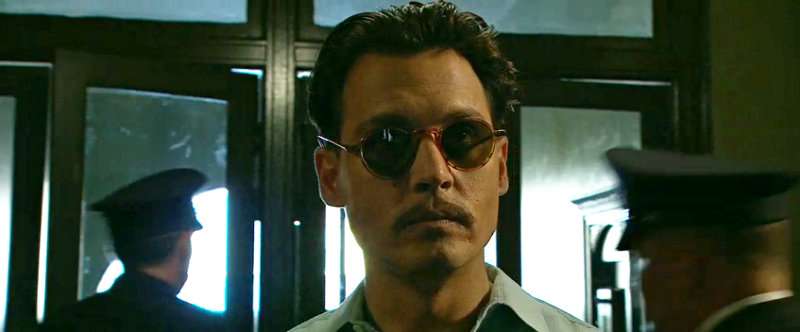Published on
Cinescene. JOHNNY DEPP AS JOHN DILLINGER IN PUBLIC ENEMIES: A COOLY METICULOUS DIGITAL LOOK.
JOHNNY DEPP AS JOHN DILLINGER IN PUBLIC ENEMIES: A COOLY METICULOUS DIGITAL LOOK.
NO FILM CHIAROSCURO OR HIGHLIGHTING, THE EFFECT IS SOMEHOW BEAUTIFUL. The devil is in the detailsIt's as hard to get a grip on Mann's impressive but vaguely off-putting new movie about John Dillinger's last thirteen months as it is to project oneself into the coldly beautiful digital images. The title itself provides a clue to the problem: it doesn't focus on the star criminal embodied by the charismatic and -- here -- cooly dashing Johnny Depp, whose quips and provocations in the trailer draw us into the theater to see him, only him, and his bold exploits. It points instead to the wider focus of Mann's book source --
Vanity Fair writer Bryan Burroughs' 600 pages of meticulous research,
Public Enemies: America's Greatest Crime Wave and the Birth of the FBI, 1933-34 . Relentless G-man Purvis (a convincing but bloodless Christian Bale) and his rising boss FBI chief J. Edgar Hoover (Billy Crudup, both droll and period) are part of another story as important as the bank robber's final wide ride, the story of the growing cruelty and relentlessness of the forces of American law.
Look at another title of a movie about a doomed but spectacular crime spree: Arthur Penn's
Bonnie and Clyde. That 1967 classic works so well because it's character-driven. Even in the sketchy but powerful scenes that outline John Dillinger's romance with French-Native American hatcheck girl Billie Frechette (Marion Cottillard, working wonders with limited material), character is subsidiary to function: "I rob banks," Johnny says. And then: "What else you need to know?" Well, quite a lot, actually, for a rounded character to emerge. Mann's movie is meticulous as to period look, to facade, but not to essence. Its street scenes are full of detail, its clothes immaculate and accurate. Taking place in 1933-34, however, it provides too few overt signs of the Great Depression. The film is also misleading in showing the Dillinger gang only robbing grand, marble-hall-and-column banks, when in fact they mostly robbed small and middling-sized ones.
The overall result is a collection of contradictions. There is romance, but the effect isn't romantic. There's precise realism, but the overall effect isn't realistic. Perhaps the only unmitigated pleasure that remains is the images, the digital with its cold precision, its crisp edges even when many of the cameras are jiggly and hand-held, the depth of detail in darkness, the color that is neither bright nor faded, the sheer satisfying crispness of everything and everybody. And in this one aspect, a sublimely heightened vérité whose look is something quite new,
Public Enemies matches
Bonnie and Clyde: it makes us feel we're seeing period scenes with contemporary eyes. The best and most memorable images are the complex ones you won't see in stills where many actors are running back and forth in front of the camera, the gunshots are popping realistically in every direction, and there is no hint of the usual film chiaroscuro or highlighting, but the light is somehow beautiful. The cameras move too much, but they do rub your face in the action. What's gong on you may figure out later.
Maybe you can't avoid mythologizing when you shoot a movie about a famous Thirties bank robber and shouldn't try to, but Mann does. He's working, with great accomplishment, from that meticulous historical account, involving dozens of players on both the cop and the crook sides. Dillinger (and alternatively the totally unappealing Purvis) stay in the foreground. But there too is a contradiction, because the way Depp plays his part, witty, cold, and focused rather than warm and down-to-earth, his character ends up being impressive, but ultimately absent. (Contrast Warren Beatty's impotence and blinking charm as Clyde Barrow, an absence you yet want to cuddle.) Even when the characters are strong in
Public Enemies, they don't get enough chance to interact. Dillinger is rarely with Frechette. His chance to confront Purivs is too brief, the moment when Purvis tells him he's to be extradited to Indiana and he quips, "There's absolutely
nothing I want to do in Indiana." He's not facing off Purvis; he's playing to the audience.
This should have been one of the showpieces of the season, and it
is a blockbuster with class in a world of junk. Its virtuoso look and complexly orchestrated scenes will hold up with time, but despite a freshness in approaching familiar genre material, it's missing that certain
je ne sais quoi. Even though it's different, it lacks style, movie-making panache, playfulness, suspense, the ability to push a climax, the capacity to take a breather so the momentum builds up again. There's an impressive twittering machine functioning here on all its Ford V8 cylinders. But the light touch is missing, the capacity to make you say "Yeah!", to simultaneously stand apart and admire while utterly caught up in it all.





